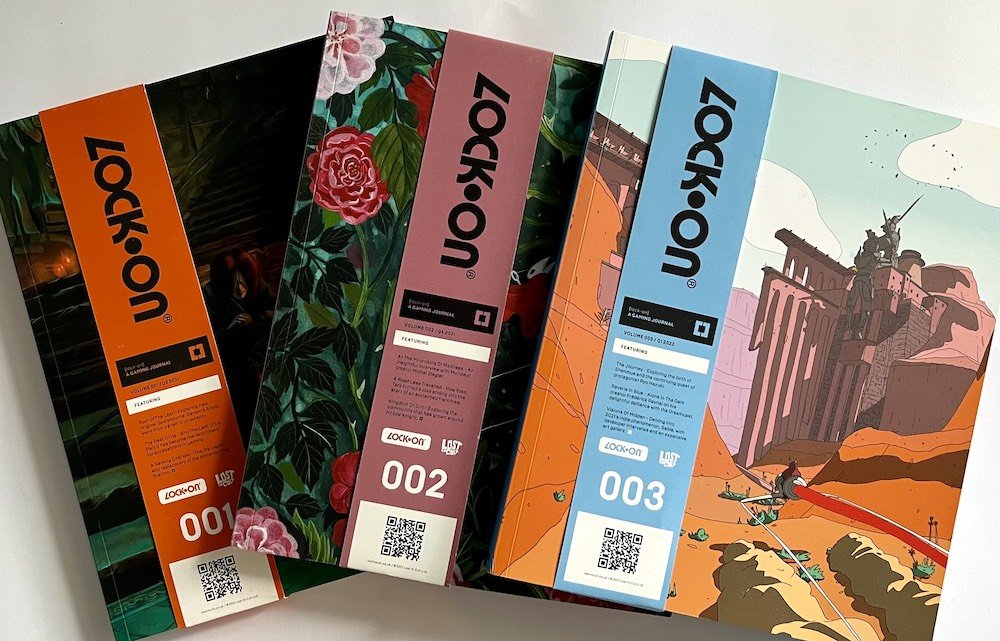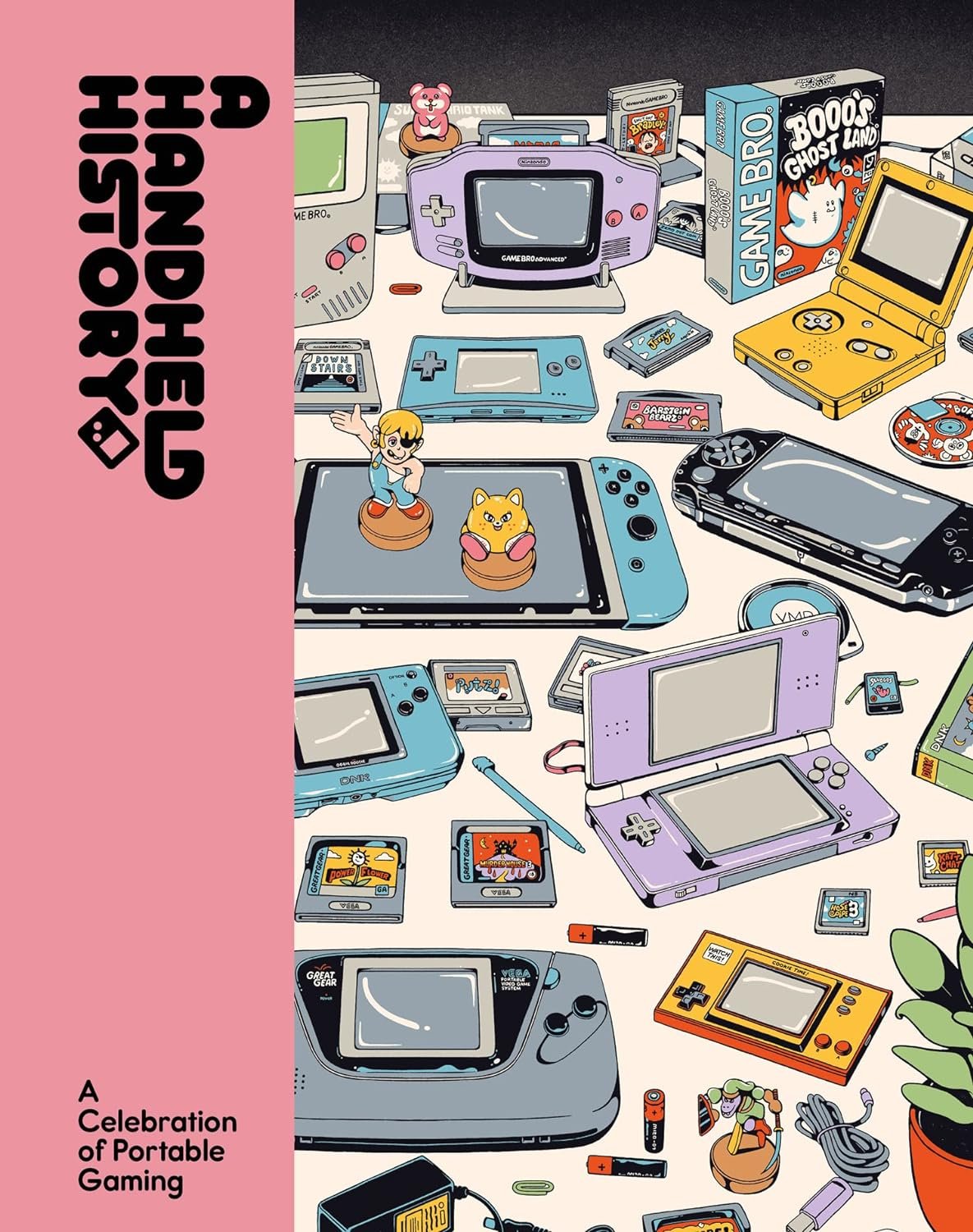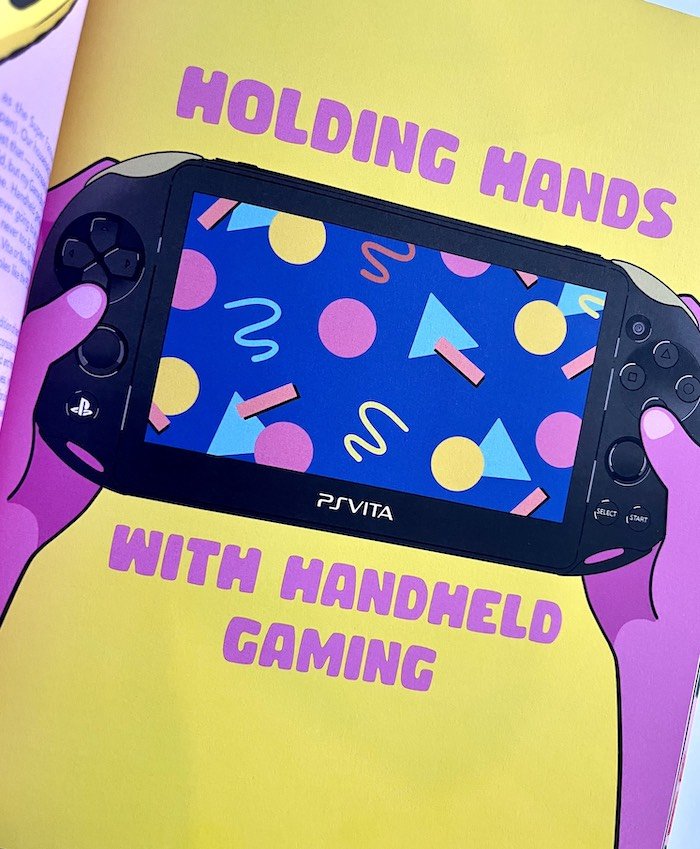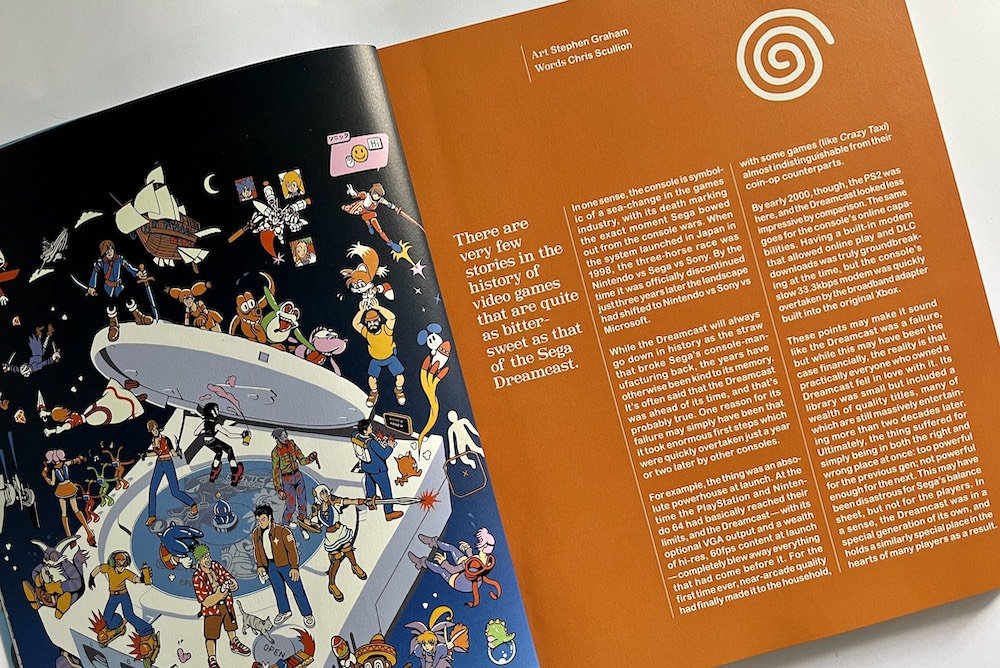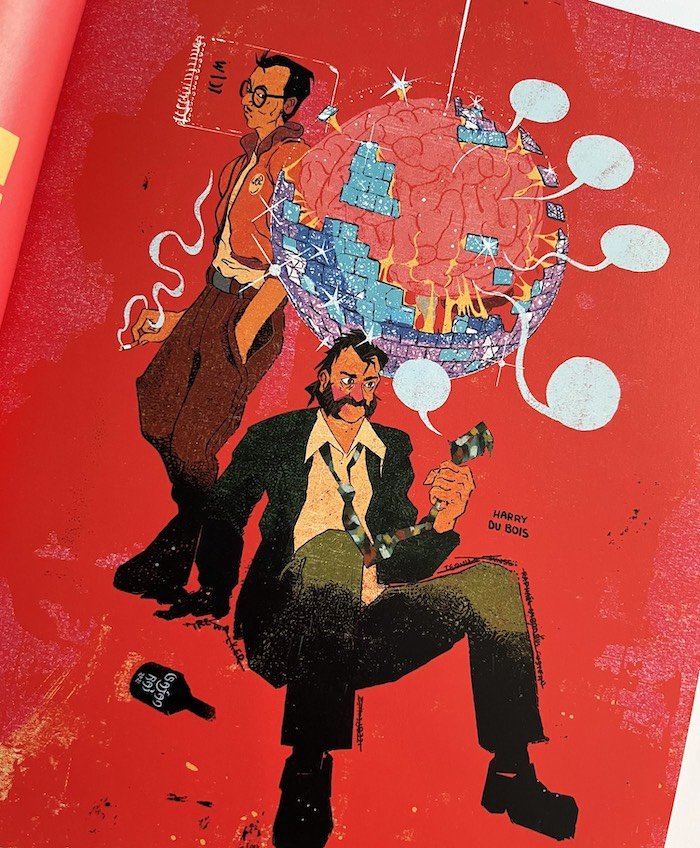Lost in Cult
From [lock-on] magazine to A Handheld History
An interview with CEO and Creative Director Jon Doyle
SEO, social media and data analytics have fundamentally changed the way we write about video games online… And not necessarily in a good way.
What began with optimised article titles and some basic A/B testing has opened a pandora's box of data led ‘content’. Material whose sole purpose is to sell the adjacent ad space.
To steal a line from Common and Kanye West’s The Food, “Everybody’s gotta eat,” and maintaining a commercial website ain’t cheap. But it can also be disheartening to see the medium reduced to clickbait articles, cheap listicles, keyword stuffing and “someone said this on Twitter,” outrage farms. Creativity and deep dives forsaken at the altar of spreadsheets and accountants.
So when Lost in Cult’s [lock-on] magazine first appeared in 2021 it caused waves within the industry. Here was a printed publication that gave writers and artists the scope to explore video games in a more considered, nuanced way. A lavish, limited-run publication that combined the enthusiasm of magazines from days gone past with the production values of an art book.
Three years, several magazines, and a couple of side-projects later that initial magazine has grown from humble Kickstarter beginnings into a fully fledged boutique publisher employing several staff. The latest releases is a book with HarperCollins, A Handheld History, out October 17.
I was lucky enough to speak with founder Jon Doyle about the book, handheld gaming, and the future of limited run publishing in a digital world. Here’s what he had to say…
What are your memories of handheld gaming growing up? Which systems and games evoke nostalgia for you?
“My mind always goes to the Game Gear. My dad got me one when I was young, and we went around to car boot sales buying loose games for it. I didn’t even know what a Game Gear box looked like until much later! So many memories wrapped up in that system.
“My favourite handheld, though, is the GBA. I remember getting that for Christmas, my dad pulled it out from behind the couch — it was The Legend of Zelda: The Minish Cap’s special edition. What an incredible lineup of games on GBA, Sonic Advance 1-3 in particular always take me back to the early 2000s.”
You could argue that handhelds offer a parallel / alternative history of gaming, their limitations forcing developers to approach game design from a different perspective. What’s your take on that, and what do you feel makes handheld game design unique?
“The relationship between home consoles and handheld systems is quite interesting. Take a look at some of Game Boy’s marquee games, for example. Within that library, you have titles like Metroid II: Return of Samus or The Legend of Zelda: Link’s Awakening which feel like they’re punching closer to a 16-bit weight in terms of design philosophy. These feel as though they’re chasing and sufficiently emulating the appeal and scope of their console counterparts. Other titles like Tetris and Dr. Mario, whose round-based design is often thought of as archetypally ‘portable’ were cross-released on NES.
“We often think about portable gaming through the lens of inherently lo-fi tech [specs] or the notion of “pick-up-and-play” game design. But ultimately, there is a lot more give and take between home systems and portable ones than is regularly discussed.
“By the time we reached DS and PSP, the out-and-about goal of the systems was to fall as close to lock-step with home consoles as possible. Nintendo Switch seems like the natural conclusion to the decades-long march towards home console parity. In doing so, there is perhaps something to be said for what’s lost — the unique creativity that springs from designing for weak hardware on, typically, a lower budget. However, it feels like developers have always been straining against what feels possible on our littlest systems.
“There are clear rejections of this idea, the Playdate is a wonderful example. Its games embrace the joy of being small, and that’s the same joy that has resulted in whimsical masterpieces across generations, like WarioWare or Rhythm Heaven. But even those Nintendo series moved to consoles. There’s something rare and totally captivating about what Panic is doing with the Playdate.
“On the whole though, waffling about the growing pains of portable game design ignores a compelling central truth about portable systems themselves. The form factor does the heavy lifting. We look at a game like The Legend of Zelda: Tears of the Kingdom — a massive, complicated open-world adventure. By playing that game in handheld mode, my relationship to Link feels uniquely intimate.
“That’s been the greatest point of continuity within portable systems and the most stark contrast with come consoles. They bring you physically close to the game and you develop a sense of ownership over that device. So much of portable gaming’s success can be attributed to that.”
What about the impact of smartphones? We all have the means to play a game anywhere these days, but somehow it doesn’t feel the same. Do you feel smartphones are part of the broader handheld gaming narrative or something separate?
“There’s a particular anti-mobile sentiment that travels throughout a lot of gaming communities. In some ways, that’s completely earned. You can draw a fairly straight line from the App Store to a lot of troubling monetisation and design practices that we now see across the industry. But the sort of boogeyman image of mobile gaming that many of us still hold isn’t totally fair.
“Initiatives like Netflix Games have produced some gems like Ojiro Fumoto’s Poinpy, Apple Arcade has produced its fair share of brilliant titles as well. We must also look to a game like Pokémon Go — perhaps the truest realisation of Pokémon Red & Blue’s spirit of adventure that we’ve ever seen.
“I think the future will be kinder to mobile gaming than the present moment is, and certainly kinder than the past was.Whether we’ll ever acknowledge these games in a larger continuity of handheld development is unclear, mobile gaming is a decidedly unique creature. The lack of standard input, the positioning of these games as part of productivity devices — you could maybe draw some sort of cheeky parallel between the Game & Watch and gaming on smartphones, but that’s hard to do when hardcore players have come to know conventional portable gaming as one thing, and mobile gaming as another.”
More generally, Lost in Cult (and the associated publications) have seen massive success since launch. Why do you think they’ve been so warmly received and when did you realise, “Wow, I might be able to quit my day job.” Also, how did you manage to do all this with (I assume) an actual day job?
“The launch of [lock-on] Vol. 001 was tough. I sold so many of my things, put everything I had creatively and emotionally into the project. It was a massive risk, but I had just lost a close friend around the time of COVID and needed to chase this dream. I worked all hours of the night — I was finishing up my regular working days and then getting stuck into [lock-on]. There wasn’t much rest during this time.
“But then [lock-on] Vo.l. 002 happened, and it made a bigger splash. And then [lock-on] Vol. 003 happened, and my team was twice as big. By the time we were launching A Handheld History and [lock-on] Vol. 004, Lost In Cult was unrecognisable. Now, I have a team larger than a dozen, the vast majority of which being full-time. The most incredible bit for me wasn’t realising that I could quit my day job, but that all my friends could quit theirs too. I think people have really latched onto the independent spirit underpinning Lost In Cult and the passion for games that’s present in everything we make.”
For a bit more context, can you let us know about your history with gaming and associated publications. From what I understand you’re an art Director who previously worked on publications like Ninty Fresh Magazine?
“Yes, I used to work for Ninty Fresh Magazine, helping to shape their art direction by commissioning covers and designing internal spreads. It was a fantastic learning experience, and I met many of the people I still work with today thanks to Ninty Fresh.
“Most of what I learned about the games industry overall though came from my time as a high-ranking manager of Blockbuster. I ended up pushing the games side of the business massively and got looped into all sorts of events as a result. Trade shows, console launches — I found myself around games in a very unique capacity fairly early on in my career. It’s pretty funny to look back on those old photos, such a different time!”
How does the new book with Harper Collins ‘A Handheld History’ differ to the previously released Lost in Cult Publication ‘A Handheld History 88-95’?
“We think of [the new book] as a survey of hardware that takes you on an explorative jaunt through roughly five decades of portable systems.
“A Handheld History focuses on system retrospectives and personal essays, addressing topics like the educational applications of Nintendo’s handhelds, and the experience of being a female player at a pivotal point in handheld gaming.
“The [previously released] Handheld History: 88-95 features long-form interviews, reflections on pivotal games, retrospectives on the weird and wonderful oddities of the time, and general features that complicate our understanding of the era.
“We view both books as essential and inherently intertwined. You’ll want to pick up a copy of A Handheld History to gain an understanding and appreciation for the overarching progression of portable systems, and then a copy of A Handheld History: 88-95 to mine deeper.”
It’s great to hear about your Everything Not Saved initiative, can you tell us more about what that involves and what your goals are.
“Everything Not Saved is an especially important initiative for us. It is, by design, a loosely defined ethos as we are looking to house many remarkably distinct projects under its banner.
“The uniting principle between them all is that games preservation is about more than software. This is a refrain we love to share and it warrants reaffirmation — development histories, concept artwork, industry stories, music, events, the larger culture around the games themselves is critical to remember. We are currently working behind the scenes with legacy game devs and contemporary figures on a suite of Everything Not Saved concepts that we’ll be able to share more about soon.”
It feels like there’s been a resurgent interest in physical, limited run magazines in recent years. We’re seeing small, hyper-focused projects popping up more and more. Where do you see the future of printed gaming magazines and media?
“The massive advantage in the print media space is that we sell to an organic audience. This is the critical difference between working in print and working for the vast majority of digital publications. Decoupling our work from SEO allows us to tell stories not in the way that we think Google thinks you’ll enjoy (it’s cumbersome enough just typing that), but instead in an authentic, robust manner.
“Since we’re in this more-for-less cultural moment of free content and subscription services, it’s easy to assume that people don’t want to pay for anything. But the reality is that they’re happy to pay for something premium. The audience is rarely given anything premium though because digital publication is often predicated on traffic volume and keywords, with the goal of scooping up passersby. What print offers is both physically premium but also narratively premium, scratching particular itches that aren’t logistically viable online in the digital churn.
“Everyone’s unique success in the print space is a win for us all, as it brings in more dedicated readers. We all keep growing our reach and list of achievements — it’s a very collaborative space. I like that, this feeling of community as we amplify each other’s campaigns and share talent between publishers. As digital games media continues to be gutted, our position just looks stronger and more people look to us for both work opportunities and high-quality commentary about games.
“Our goal isn’t to deride the great work that is being done in digital games media, I want to make that exceptionally clear. There are so many incredible freelance writers and editorial teams alike doing the critical work of thoughtfully evaluating games and the industry at large — the problem is the system that they’re forced to work within and the corporate powers putting them in difficult situations. If anything, we’re just thankful to be removed from the mandates and realities of that sphere ourselves.”
What have you learned about publishing (and what mistakes have you made) with the [lock-on] series? Also, where to from here?
“Almost no one at Lost In Cult has a background in book publishing, we’re not beholden to the conventional wisdom in the field. Sometimes, that’s to our benefit. We can surprise and delight our readers because every project we conceptualise comes from a ‘can we’ mindset.
“Can we die cut holes through the book to make the illustrated action come to life? Can we write a feature that you actually ‘play’ by manipulating your book? We’re asking these questions because we truly don’t know — every new idea is an experiment. I think people like that.
“But, we also have a lot to learn about the less fun parts of bookmaking — manufacture and distribution have taken a lot of time to get down. We have a handle on them now; working with key partners that have stepped in and allowed us to focus on the creative.
“Perhaps the biggest lesson learned is that collaboration is the fastest route to success. We’ve made so many essential business relationships by offering our creative design and marketing in exchange for complementary expertise — our relationship with HarperCollins to bring A Handheld History to retail overseas is a critical example of that. They’ve opened doors that were previously wedged shut. Working on this major of a scale has been a unique and rewarding challenge, and we’re so pleased to be collaborating with their team.”
“Partnerships truly lie at the heart of Lost In Cult’s future, too. I don’t want to overstate what’s coming next, but we’re in the enviable position of working alongside some of the absolute finest development studios, game publishers, book publishers, designers, writers, and personalities in the space. I know that’s vague, but when our 2024 calendar is made public, there will suddenly be a lot to say.”
A Handheld History: A comprehensive celebration of handheld consoles and their iconic games is out via HarperCollins Publishing. Order a copy online.
….
